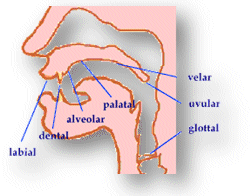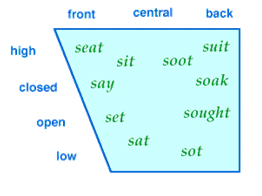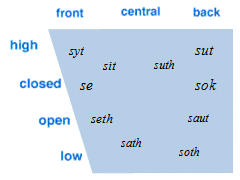Old Piscean language
The term 'Old Piscean' is used to describe Piscean language (between 2005 and 2007) that is in any way dissimilar to the modern dialect. Old Piscean technically has several stages and was changed by Anderson rapidly. However, few records of the language remain and it is currently understood to have had three major transitions, the first of which is barely mutually intelligible with modern Piscean, while the last of which is closely related. Old Piscean was always written using the Latin alphabet, before the introduction of the Andersonic alphabet, which defined a new age in the language.
Early Old Piscean
Early Old Piscean, then referred to as Gallifreyan (G'ow'lufrën) after the name of the protagonist's home planet in the popular science-fiction programme Doctor Who, was an extremely basic variety of the language. It began as the fictional 'vulgar' language of the Time Lords in Anderson and Dearden's abandoned novel Wasporella, one of the only remaining sources that proves Gallifreyan's existence. Mostly, it appears to be a creole of modern English vocabulary [1], with some invented stems and influences from Romance languages; in the novel from whence it came, Gallifreyan was supposedly the result of the Festaran conquest, a race of aliens who had observed cultures on Earth, especially enjoying British mannerisms, and had been inspired to alter their language.
From Wasporella is the following excerpt of early Old Piscean text:
'Ne G’ow’lufrëän réfömiä foЋ < À’de’löd Inplaçä Gég Zil > skrip’ine: William Shakespeare foЋ Ongliä, Barg Brætannik, Yö’rûps, puЋ Teπniä, à ne Lûdöniä Likwæ’sek’ine: Täm Seköndriäkën Nundiä’fondät’air’ëä, tiam’ine: IV:00;00. Réligën y’ow’l’air’s cuπ Krövën’déçæ’berЋä! Öd lokäti’de’biß inkluçä Frarnäçëä, D’oy’cëä, RûЋëä, IjiÞëä, Chinnëä, JiÞänëä, Östarlëä, Harbor’ore Ajäçënsë-ύ foЋ Annërikä, Jumäkä, nes Méksikö. Skrip’ëlög’ine, ne puЋ Sakörëä, Pökävil, Dash’tæt, Içæn Kaßuذl, nes Olëänfäkëä. Ermendä a’ow’l’air's tu réçæ elög dat.'
This text reveals many features of early Old Piscean. Of particular note is the frequent use of apostrophes. The primary reason for this is due to 'sound units': these are groups of letters that make a widely-used sound in the language, almost becoming letters themselves by being isolated from surrounding letters. Sound units from the excerpt include 'ow', 'ine', 'air', 'oy' and 'ore'; these units are all considered members of the Old Piscean alphabet, which also consists of:
a à ä b c з d e é æ ë f Ћ ύ g h i j k l m n ŋķ o ö p Þ r π s ß ç t u û v w y z ذ
The exact phonological values of these letters cannot be completely determined. Note that some letters are corrupted and do not match their original values: for example, з is a double C, Ћ is a double F (or TH), Þ is a double P and π is a double R.
While the excerpt resembles an English creole, some original compounds have been made. For example, observe the word 'likwæ’sek’ine', which is derived from [likwæ ('liquid')]+[sek'ine ('section')]. This word is translated into English as 'river'. It shows that early Old Piscean was heavily dependent on apostrophes, not only to make new 'letters' from sound units, but also to separate words in compounds.
Some words in Old Piscean have different meanings from those in English from which they were produced:
- réfömiä - from 'reform' > 'adaptation'
- réligën - (probably) from 'realign' > 'treat' (verb)
- ajäçënsë - from 'adjacency' > 'state'
- ermendä - (possibly) from 'amend' > 'contact'
- elög - (probably) from 'elong[ate]' > 'more'
- dat - from 'data' > 'information'
Early Old Piscean was crude, so to speak. There were no conjugations or alternate forms of verbs whatsoever, only a stem that was used in every instance; the word 'neeЋ' placed after a stem made it past tense. Piscean also incorporated a dash as a significant linguistic device because the language had no standalone verb translated as 'to be'; it merely had the word 'nee', which meant 'it is':
- [M'ow'l - nee] - [I - it is]>I am
- [A’ow’l’air’s – nee dæpätä-ŋķ] - [we - it is going]>we are going
(Sometimes, 'liz' was used instead of 'nee' for a purpose that has become unclear.) Note that a hyphen and 'ŋķ' after a verb stem indicates present continuous tense, which was also adapted as the sole future tense. A hyphen and 'ύ' indicates a plural. Either '-ύύ' or '-ύύύ' were used to indicate possessive forms, although the reason for choosing one of the two is now unknown.
Despite its clumsiness, Old Piscean would eventually become a functional, albeit limited, conlang in its right, aside from Wasporella.
Survival of early Old Piscean
Some vulgar Gallifreyan vocabulary has survived throughout Old Piscean and has ultimately been adapted into modern Piscean. For this reason, Gallifreyan is still classified as Piscean language. Vocabulary retained from Old Piscean is now recessive, due to the Piscean's dominant new foundation of Old English and German. So words have been replaced, while the old words are sub-branches to fill more specific meanings. Observe the following examples:
- Old Piscean gibs'y'ow'l - English thank you
- Modern Piscean gibsjówl - English phrase You shouldn't have!
- Modern Piscean tancee - English thank you
~
- Old Piscean winfanëä - English flight
- Modern Piscean Winfanéje - English flight (only referring to a single flight (journey by flight), e.g. a flight on a plane)
- Modern Piscean Fleojung - English flight (only referring to the ability of flight)
~
- Old Piscean harbor’ore - English community
- Modern Piscean Harbortsche - English ethnic-minority community
- Modern Piscean Gefere - English community
~
- Old Piscean y’ow’l’æçé - English yours (singular)
- Modern Piscean Jowleçaé - English it's yours! (exclamation; referring to something that wasn't previously theirs or not what they believed to be theirs)
- Modern Piscean jor - English your; yours
~
- Old Piscean spannäkën - English time
- Modern Piscean Spannáccen - English time (only referring to one's sense of time, e.g. 'The time goes quickly when you're having fun'
- Modern Piscean Time - English time (only referring to physical time)
~
- Old Piscean vén’anz - English location
- Modern Piscean Venánz - English sought-after location
- Modern Piscean Pozixion - English location; position
~
- Old Piscean foЋ - English of; within
- Modern Piscean foff - English within (only in an abstract sense, i.e. not physically within something, when an [abstract noun] is within sth, as opposed to a concrete noun, e.g. 'the anger within him')
- Modern Piscean [genitive case]/in[+dative] - English of/within (only referring to a [concrete noun] within sth
~
Additionally, some early Old Piscean words have retained their original meanings because they are very functional, especially in conversation. These include:
'Nee'
As aforementioned, early Old Piscean had no verb 'to be', but had a steam that meant 'it is'. On the other hand, modern Piscean has two different verbs translated as 'to be' and a separate word 'hit' meaning 'it'.
Nevertheless, modern Piscean revives the use of 'nee' for expressions beginning with 'it is' in English in which 'it' does not refer to an actual item, at least not one that has previously been clarified. For example, many 'nee' statements relate to the weather.
- Nee wolcij - it's cloudy (at the moment)
- Nee god, dass cunn icc faran - it's good that I can go (on one occasion)
'Nee' allows one be concise in a subject matter from which the audience automatically derives the context; in this case, the weather does not need to be mentioned. Furthermore, it would be incorrect in Piscean to say 'the weather is [cloudy]' because that would be seen as describing the concept of weather, rather than its effect on one's surroundings.
Modern Piscean has also derived 'nij' from the Old Piscean word 'nee'. 'Nij' refers to the essence rather than condition. Compare the usage of 'nee' and 'nij' to the verbs 'bee' and 'zij' in modern Piscean: the principles are the same.
- Nij wolcij - it's (generally) cloudy
- Nij god, dass cunn icc faran - it's good that I can go (regularly)
'Tiamíne' and 'eatíne'
In modern Piscean, it is incorrect to say 'the time is ...' and 'the temperature is ...' because these are seen as describing the concepts of time and temperature themselves rather than making a remark about their current state.
'Tiamíne' is from Old Piscean 'tiam'ine' and is ultimately related to modern English 'time'. Translated into English, the word means 'the time is'. In Piscean, it is customary to always use the twenty-four-hour clock and to separate the time into two two-digit numbers (when using hours and minutes) using a hyphen:
- Tiamíne 13-22 - the time is 13.22/1.22 p.m.
'Eatíne' is from Old Piscean 'ëät’ine' and is likely related to modern English 'heat'. In English, the word means 'the temperature is'. It used to state the temperature of the general surroundings, not a specific item, thus not taking various temperature-affecting factors into account. With the Celsius scale in Piscean, a lower-case C is placed before the figure. (Similarly, with the Fahrenheit scale, a lower-case F is placed before the figure.)
- Eatíne c22 - the temperature is 22°C
'Nes'
Throughout Piscean's history, there have always been two words for 'and', the usage of either depending on context. Early Old Piscean had 'uπ' and 'nes'. Later down the line, modern Piscean had replaced 'uπ' with Old English 'and', whereas 'nes' was kept to cater for its unique meaning.
To know whether to use 'and' or 'nes', when translating English, can be achieved by imagining possible contexts. If the word 'and' could be replaced by 'and then' and still make sense, one should use 'nes'. If the word 'and' does not make sense in its context when replaced by 'and then', one should use 'and'.
Middle Old Piscean
Middle Old Piscean is the clearly transitional stage between early and late Old Piscean. At this point, the name 'Gallifreyan' was completely replaced by 'Piscean' after the star sign of its inventor Anderson and also the name of his proposed nation (New Pisces).
Middle Old Piscean seems to retain much of the vocabulary from the earliest dialect, but is more fuctional, having been influenced directly by Romance and Germanic languages, especially French and Italian and - to some degree - German.
In this dialect, spelling reforms become apparent. 'Præma' (early Old Piscean) becomes 'pryma' in middle Old Piscean and ultimately becomes 'prime' in the modern dialect of the language. Li Pryma Piskeser Kasta enables one to hear middle Old Piscean in usage. Furthermore, the document The Reformed Constitution for the Language of Piscean shows how individual letters should be pronounced:
The model
Piscean is mainly a logical language, as opposed to naturalistic. It is easy to speak and even to make up if in doubt, because of the reduced irregularities in its system.
The sounds
Piscean has a wide array of sounds, as its base words are adapted from several different languages, with high Romance and Germanic influences. However, certain sounds have been changed and Piscean should be a language which is easy to speak, that rolls naturally off the tongue. The pronunciation should not be an art; thus, no aspirated nasal, as in French, or guttural sounds are included. Pronunciation is very similar to English.
Here is an example of a word pronunciation grid for English, which helps with the position of vowels in the mouth. Below are the equivalent sounds for Piscean, so an Anglophone understands how to say them.
Vowels in words that don’t end in ‘h’ are always emphasised. In words that do end in ‘h’, the ‘h’ is silent, but the word’s vowel is closed rather than open. There are hardly any closed vowels in Piscean. Put simply, one of two tones is expressed by the presence or absence of an ‘h’.
- The vowel distinguished by a grave accent is always the most stressed in the word.
- If there is no accentuated vowel, but the word ends in a normal vowel, that normal vowel is the most stressed in the word.
- If there is no accent and the word ends in a consonant, the first syllable of the word is the most pronounced.
It is hard to find strict phonological constraints in Piscean. Consonants such as ‘m’ + ‘r’ and ‘v’ + ‘l’ are illegal in English, but they can be used in Piscean. However, they tend not to be used due to the constraints of the languages that influence Piscean.
The letters
Piscean uses the Roman alphabet and can potentially use the following letters, where examples are given for the variations of pronunciation from English:
- a – father, bat
- b
- c – which
- d
- e – say, bet
- f
- g – garden (always hard)
- h
- i – bit, say (at end of word)
- j – show
- k
- l
- m
- n
- o – boat, hot
- p
- q – queen at the start of or within words; back at the end of words
- r – barn (within word), whale (at start of word)
- s – boss
- t
- u – rune, soot
- v
- w omitted
- x
- y – see (long vowel)
- z – single ‘z’, zoo; double ‘z’, pizza
- à
- è
- ì
- ò
- ù
- ỳ
NOTE: All accentuated vowels are to be aspirated, as if an ‘h’ is preceding them. ‘Duò’, therefore, is doo-hoa.The construction of words
Base words in Piscean come from already existent languages and from that point, you can combine several base words to make a new constructed word. For example, the word for ‘succeed’ in Piscean is ‘fetaben’, which literally means ‘make good’. The word for ‘fail’ is ‘fetamales’, which translates ‘make bad’. From these constructed words, Piscean can make new routes by attaching suffixes. A ‘success’ is a ‘fetabeno’ while a failure is a ‘fetamaleso’. A successor is a ‘fetabenu’ and the study of success, if there ever was one, would be ‘fetabeny’. This system is easy to make up in everyday speech once you understand it and assists with the growth of the language. The base words ‘feta’ and ‘ben’ come from French ‘fait’ and Italian ‘bene’.
Note that modern Piscean still does combine words, but not in the definite matter as in middle Old Piscean. However, there are still remnants in modern Piscean of words that have been combined that way. As traces of early Old Piscean vocabulary, middle Old Piscean fills more obscure gaps in the modern dialect. Observe:
- Old Piscean fetaben - English succeed
- Modern Piscean fetábenan - English surpass expectation
- Modern Piscean folgan - English succeed
Latter middle Old Piscean
Latter middle Old Piscean is classified as a moderate transition, but not major because the middle Old Piscean dialect is not dramatically affected. However, despite little new vocabulary, this stage saw an influx of inspiration from modern Dutch. Arguably, latter middle Old Piscean is every bit as crucial as the other transitions, as it marks the point at which Piscean first becomes a distinctly flavoured West Germanic language.
Late Old Piscean
This form of Piscean is the distinct bridge between the old dialects and the modern dialects. It is very close to modern Piscean, but without any Old English influence. However, the earlier phonology was adapted to an inventory that would be retained in modern Piscean and Tauro-Piscean, all nouns began to be capitalised, a new - albeit mainly synthetic - tense system was introduced and much Romance vocabulary in common use (such as the articles and numbers) was ruthlessly replaced by that of Germanic - namely Dutch and German - origin. Of particular note are the word-forming tendencies preserved from Old Piscean: instead of borrowing words directly, compounds were formed, e.g. the late Old Piscean word 'Getranfer' means 'change', from the Germanic prefix 'ge-' plus middle Old Piscean 'tranfer' - literally 'that which has been transferred'. This compounding is one of the major elements that separates late Old Piscean from the modern dialect, which does prefer to borrow directly from German and Old English.
It still remains unclear why the Dutch link was severed in favour of the Old English link, despite the preservation of many German words. It is assumed that Anderson felt the Dutch language to be too modern, meaning that its impurities may have caused confusion, especially considering that a large amount of modern vocabulary already came from German; thus, an extinct classical language, i.e. Old English, would have had large appeal for the foundation of modern Piscean, with modern German continuing to fill gaps in the vocabulary.


